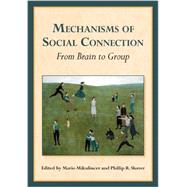Social connections contribute to our vitality and sense of meaning and—at times—to our anguish. The mechanisms underlying human connections have long fascinated researchers in the social sciences and, more recently, in neuroscience. Yet there is too little dialogue among these scientists and too little integration of findings.
This book aims to rectify that situation by surveying cutting-edge theory and research on social connections. Chapters explore the formation of social connections at four levels of expression: neurological, developmental, dyadic, and group.








